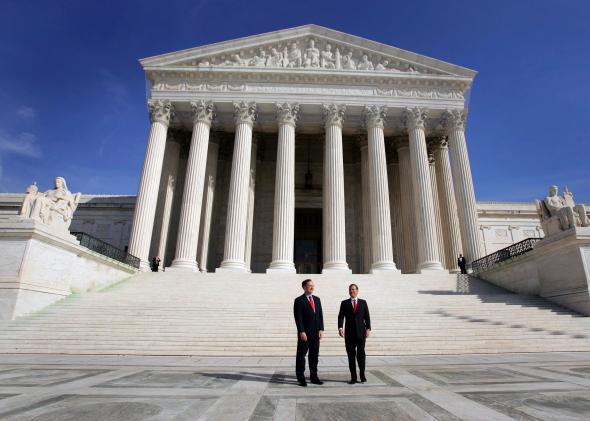In much of the United States, gay people can legally be fired simply for being gay—and Congress seems unlikely to change that anytime soon. But anti-discrimination advocates need not lose hope quite yet: In a groundbreaking ruling on Monday, U.S. District Judge Colleen Kollar-Kotelly boldly suggested that LGBT job discrimination may already be illegal under existing federal statutes.
Because the crux of Kollar-Kotelly’s ruling is bound up in eye-glazing civil procedure, the groundbreaking nature of her opinion is easy to miss. But make no mistake—this legalese-packed ruling could do nothing less than provide workplace non-discrimination protection to gay people across the country.
The setup of the case is simple. Peter TerVeer, a Library of Congress employee, sued his supervisor, John Mech, for job discrimination, alleging that Mech created “a hostile environment” by inflicting his “sexual stereotypes” on TerVeer. (Translation: Mech mistreated TerVeer and subjected him to a barrage of nasty, anti-gay comments on the job.) TerVeer sued under Title VII of the Civil Rights Act of 1964, which forbids sex discrimination (including irrational sex stereotyping) in the workplace. Mech countered—and here’s the civil procedure twist that only a lawyer could love—with a 12(b)(6) motion that TerVeer “fail[ed] to state a claim upon which relief can be granted.”
Mech, in other words, argued that because Title VII prohibits sex discrimination but not anti-gay discrimination, TerVeer’s case is so flimsy that it doesn’t even deserve to go to trial. Almost everyone expected Kollar-Kotelly to agree—but instead, she smacked down Mech’s motion, allowing TerVeer’s case of sex discrimination to move forward to trial. TerVeer’s logic, which Kollar-Kotelly clearly finds plausible, is that anti-gay discrimination is sex discrimination: By disapproving of TerVeer’s orientation, Mech was essentially condemning TerVeer for not properly fitting into his gender role. Men, Mech thinks, should only love women, and to violate this rule is to breach the basic roles of manhood. This interpretation—lucidly spelled out by Chai Feldblum of the Equal Employment Opportunity Commission—would seem to fit comfortably with the Supreme Court’s broad definition of discrimination based on sex stereotyping.
TerVeer, of course, hasn’t actually won his case yet: He now has to prove to the court that Mech really did discriminate against him, though the record suggests that he has a slam-dunk case. (Mech allegedly hounded TerVeer with repeated assertions that he was going to hell, and then launched a campaign to assassinate TerVeer’s character within the workplace.) Presuming TerVeer doesn’t settle, the case could wind through several appeals before landing on the Supreme Court’s doorstep. And even then, there’s no certainty the justices will buy into TerVeer’s Title VII argument: Justice Anthony Kennedy, the inevitable swing vote, has a mixed record on sex discrimination cases, though he seemed to entertain the gender discrimination theory during oral arguments for the gay marriage cases.
But if Kennedy’s remarks during those arguments were indeed a peek into his reasoning, then Kollar-Kotelly’s opinion may well represent the first step in a landmark legal battle to achieve ENDA’s goals without actually passing ENDA. It would be nice, no doubt, if our legislators would do what most Americans want them to do and just outlaw LGBT job discrimination right now. But Title VII—which is incontestably the law of the land—already protects Americans against arbitrary, obsolete biases in the workplace. Peter TerVeer claims he suffered from precisely such a bias. Why shouldn’t Title VII protect him from a boss who assassinated his character simply for loving another man?
